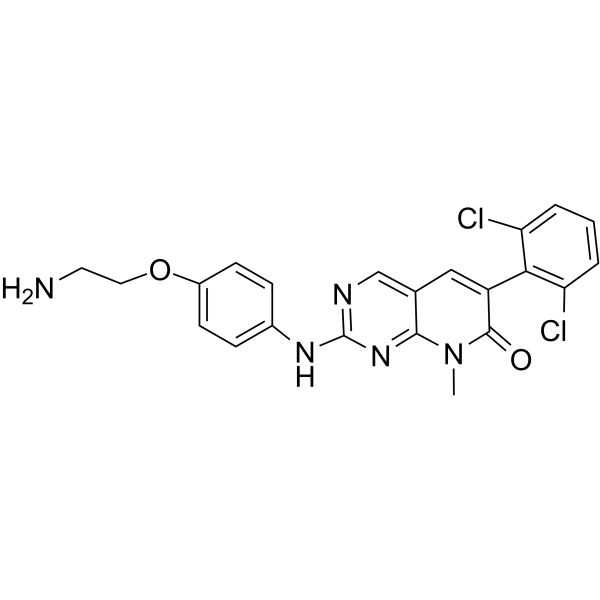
PP58
CAS No. 212391-58-7
PP58( —— )
Catalog No. M26578 CAS No. 212391-58-7
PP58 is an inhibit of PDGFR, FGFR and Src family.
Purity : >98% (HPLC)
 COA
COA
 Datasheet
Datasheet
 HNMR
HNMR
 HPLC
HPLC
 MSDS
MSDS
 Handing Instructions
Handing Instructions
| Size | Price / USD | Stock | Quantity |
| 5MG | 84 | Get Quote |


|
| 10MG | 132 | Get Quote |


|
| 25MG | 231 | Get Quote |


|
| 50MG | 356 | Get Quote |


|
| 100MG | Get Quote | Get Quote |


|
| 200MG | Get Quote | Get Quote |


|
| 500MG | Get Quote | Get Quote |


|
| 1G | Get Quote | Get Quote |


|
Biological Information
-
Product NamePP58
-
NoteResearch use only, not for human use.
-
Brief DescriptionPP58 is an inhibit of PDGFR, FGFR and Src family.
-
DescriptionPP58 is an inhibit of PDGFR, FGFR and Src family.(In Vitro):PP58 inhibits anisomycin-activated p38 in a dose-dependent manner with an IC50 < 10 nM. LPS-stimulated TNF-α production is potently inhibited by PP58 with a cellular IC50 value of 3 nM. (In Vivo):PP58 exhibits some degree of selectivity in vivo.
-
In VitroPP58 inhibits Src with a subnanomolar IC50 value in the assays. PP58 behaves as a titration reagent at higher Src protein concentrations. As analyzed by immunoblotting with specific antiserum, the PP58 matrix specifically depletes Src from total lysate, whereas binding to the PP58 beads is prevented when free inhibitor is included. The ectopically expressed FGFR1 receptor tyrosine kinase is specifically retained on PP58 beads. PP58 matrix could be a novel affinity reagent for the purification of cellular pyrido[2,3-d]pyrimidine inhibitor targets. PP58 affinity chromatography leads to the identification of protein kinases belonging to various different groups and families, indicating that the pyrido[2,3-d]pyrimidine inhibitor is not selective for a set of phylogenetically related members of the human kinome. The Ki values of PP58 for p38α and JNK2 are 3.8±1.9 nM and 0.32±0.04 μM, respectively. PP58 affinity matrix also serves as an efficient purification reagent for a variety of protein kinases, which lack this structural feature and have much lower affinities for the pyrido[2,3-d]pyrimidine inhibitor PP58. PP58 inhibits anisomycin activated p38 in a dose-dependent manner with an IC50 below 10 nM. LPS-stimulated TNF-α production is potently inhibited by PP58 with a cellular IC50 value of around 3 nM. The T341M mutation abrogates the sensitivity to PP58 inhibition by increasing the cellular IC50 value of about 10 nM by more than 1000-fold. The cellular wild-type FGFR1 activity is potently inhibited by low nanomolar concentrations of PP58, whereas dramatic resistance formation is detected for the FGFR1-V561M mutant. PP58 inhibits CSK activity with an IC50 value of around 100 nM.
-
In VivoPP58 can exhibit some degree of selectivity at low nanomolar concentrations in vivo.
-
Synonyms——
-
PathwayAngiogenesis
-
TargetPDGFR
-
RecptorATX (autotaxin)
-
Research Area——
-
Indication——
Chemical Information
-
CAS Number212391-58-7
-
Formula Weight456.33
-
Molecular FormulaC22H19Cl2N5O2
-
Purity>98% (HPLC)
-
SolubilityIn Vitro:?DMSO : 62.5 mg/mL (136.97 mM)
-
SMILESCn1c2nc(Nc3ccc(OCCN)cc3)ncc2cc(-c2c(Cl)cccc2Cl)c1=O
-
Chemical Name——
Shipping & Storage Information
-
Storage(-20℃)
-
ShippingWith Ice Pack
-
Stability≥ 2 years
Reference
1.Albers HM, et al. Structure-based design of novel boronic acid-based inhibitors of autotaxin. J Med Chem. 2011 Jul 14;54(13):4619-26.
molnova catalog



related products
-
Rinucumab
Rinucumab (REGN 2176) is an anti-platelet-derived growth factor (PDGF) IgG4-like monoclonal antibody that acts by binding to the PDGF-β receptor and can be used to study age-related macular degeneration.
-
N-(p-Coumaroyl) sero...
N-(p-Coumaroyl) Serotonin is a polyphenol isolated from the seeds of safflower.?N-(p-Coumaroyl) serotonin has antioxidant, cardioprotective effects after ischemia and antitumor activity, it may be beneficial in improving vascular distensibility and in reducing cardiovascular risk.
-
Regorafénib N-oxyde ...
Regorafénib N-oxyde M2 is an active metabolite of Regorafenib. Regorafenib is a multi-target inhibitor for VEGFR1/2/3, PDGFRβ, RET, Kit, and Raf-1.



 Cart
Cart
 sales@molnova.com
sales@molnova.com


